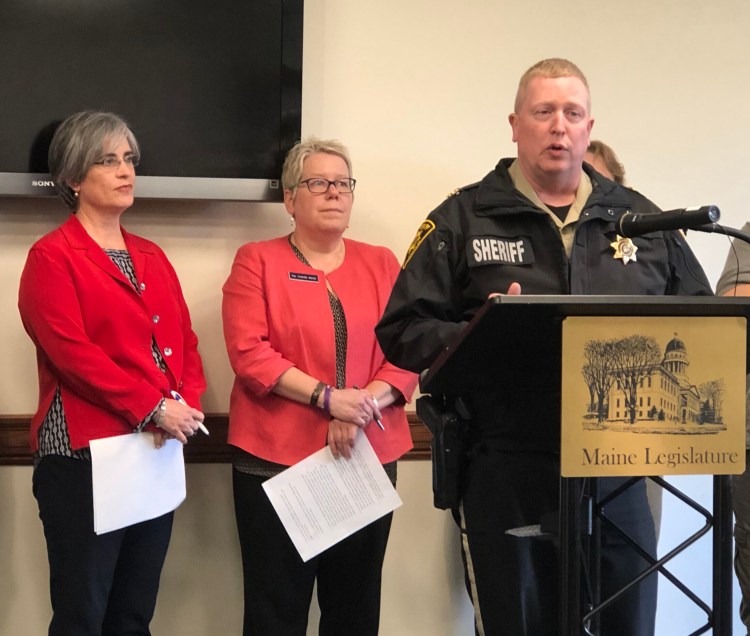AUGUSTA — Democrats in the Legislature are moving forward with a bill to create a task force that would take a sweeping look at Maine’s fragmented mental health system and develop a plan for meeting the pressing need for more community services.
The measure sponsored by Sen. Cathy Breen, D-Falmouth, was the subject of an unusual public hearing Wednesday that involved four legislative committees.
Breen said the bill is meant to fill the holes in a system that is failing those who are struggling with mental illness because reforms made decades ago never delivered on their original promises to citizens and taxpayers.
“When Maine and other states closed dysfunctional and dehumanizing psychiatric institutions decades ago, we did so on the promise that people living with mental illness would get the evaluations, treatments and support their conditions required in their communities,” Breen said during a news conference on the bill. “That promise has yet to be fulfilled. Instead, people with mental illness are far too often re-institutionalized in prisons, jails, homeless shelters and hospitals. ”
The Maine Sheriff’s Association is backing Breen’s bill.
“It’s telling that we have law enforcement here today as perhaps one of the most outspoken (groups) about a very complex issue,” said Penobscot County Sheriff Troy Morton, the vice president of the association. “Too often our jails and our law enforcement officials on the road are dealing with those that are struggling with mental health issues.”
Morton said those mental health issues often manifest in a crisis that leads to a person landing in a jail cell, which is not the correct environment for treating those illnesses.
‘PEOPLE DO FALL THROUGH’
Rep. Charlotte Warren, D-Hallowell, a co-sponsor of the bill and the House chair of the Legislature’s Criminal Justice and Public Safety Committee, said law enforcement has been asking the state to help for years, to little effect.
“They are not asking for more guns, or more handcuffs or to incarcerate more people,” Warren said of law enforcement. “They are asking us to help them better support Mainers with mental health issues.”
She said the task force or working group that Breen’s bill calls for is long overdue. “Our county jails should not be default facilities for community members suffering from a mental illness,” Warren said.
Breen’s bill, L.D. 1602, was being reviewed by Warren’s committee, as well as the Legislature’s Judiciary, Health and Human Services, and Education and Cultural Services committees, during a standing-room-only special hearing Wednesday afternoon.
“There are a lot of holes in the system, and people do fall through,” Breen said.
She said front-line workers at law enforcement agencies, hospitals and schools were being asked to help those struggling with problems that are more appropriately addressed by psychologists, counselors and social workers.
“Law enforcement has been heroic in answering this call, but it’s a call we shouldn’t be making,” Breen said. She said Maine has one of the highest suicide rates in the nation and that rate is on the rise. She noted the Senate district she represents is one of the most financially well-heeled in Maine, yet in the five years she’s served in the Senate her community has seen six teen suicides.
“We need to do a better job,” she said.
MEDICAID RATES PART OF THE PROBLEM
The working group set up under Breen’s bill, if passed by the Legislature, would assemble over the summer with the goal of offering recommendations for law changes in 2020.
Jenna Mehnert, the executive director of the Maine chapter of the National Alliance on Mental Illness, said state Medicaid reimbursement rates for those providing services to help people with mental illness have not kept pace, compounding other gaps in the system.
Mehnert and other advocates for those with mental illness or for organizations that provide services said a comprehensive review and overhaul of the Maine’s mental health system is far overdue.
Mehnert hopes the working group – which will include representatives from a range of organizations, including law enforcement and mental health care providers – would develop a long-term strategic plan for reform to get the state “… to a place where we actually have a functioning mental health system in the state of Maine,” she said. “And I can tell you, based on the calls and emails I get every day, we do not have a functioning mental health system in the state of Maine.”
The next stop for the bill, which creates the working group with a legislative resolve, will be a work session before the Health and Human Services Committee that has not yet scheduled.
Send questions/comments to the editors.




Comments are no longer available on this story